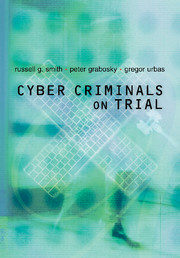Book contents
- Frontmatter
- Contents
- List of figures and tables
- Acknowledgments
- Preface
- Abbreviations
- Currency exchange rates
- Chapter One Introduction
- Chapter Two Defining and Measuring Cyber Crime
- Chapter Three The Prosecutor as Gatekeeper
- Chapter Four Cross-Border Issues
- Chapter Five Strategies of Cyber Crime Litigation
- Chapter Six The Quest for Harmonisation of Cyber Crime Laws
- Chapter Seven Judicial Punishment in Cyberspace
- Chapter Eight Sentencing Cyber Criminals
- Chapter Nine Conclusions
- References
- Appendix A Case Summaries 1972–2003
- Appendix B Selected Legislative Summaries
- Index
Chapter Nine - Conclusions
Published online by Cambridge University Press: 22 September 2009
- Frontmatter
- Contents
- List of figures and tables
- Acknowledgments
- Preface
- Abbreviations
- Currency exchange rates
- Chapter One Introduction
- Chapter Two Defining and Measuring Cyber Crime
- Chapter Three The Prosecutor as Gatekeeper
- Chapter Four Cross-Border Issues
- Chapter Five Strategies of Cyber Crime Litigation
- Chapter Six The Quest for Harmonisation of Cyber Crime Laws
- Chapter Seven Judicial Punishment in Cyberspace
- Chapter Eight Sentencing Cyber Criminals
- Chapter Nine Conclusions
- References
- Appendix A Case Summaries 1972–2003
- Appendix B Selected Legislative Summaries
- Index
Summary
This book has provided the first international study of the ways in which cyber criminals have been dealt with by the judicial process.We have provided a preliminary analysis of some salient cases from around the globe and identified some of the principal concerns that face prosecutors and judges when dealing with the sometimes novel considerations raised by cyber crime.
Principal Conclusions
In relation to our central arguments, we are now able to offer some concluding observations.
Does Cyber Crime Raise Unique Problems?
First, we have found that the prosecution and judicial disposition of cases involving cyber crime do indeed raise certain considerations that make these cases different from cases involving conventional crime. Prosecutors have been presented with some truly novel arguments, such as the computer addiction defence. Difficult evidentiary issues have also been raised. When relevant and irrelevant data on a copied hard drive cannot be differentiated, the admissibility of the evidence is brought into question.
On the other hand, however, many computer-related cases raise the same conventional issues that prosecutors face in other complex cases involving financial fraud or dishonesty. It seems, for example, that a similarly high proportion of offenders plead guilty in cyber crime cases, making it unnecessary for full and protracted criminal trials to be conducted. Were this not the case, the difficulties associated with prosecution and trial would be greatly exacerbated.
- Type
- Chapter
- Information
- Cyber Criminals on Trial , pp. 150 - 156Publisher: Cambridge University PressPrint publication year: 2004



